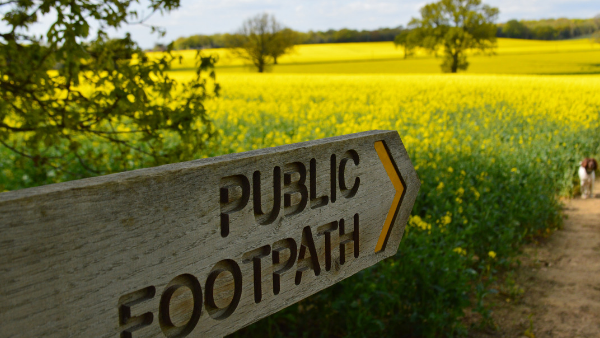Author
A new Court of Appeal decision, concerning the establishment of public rights of way, provides useful guidance for local authorities, but makes for bleak reading for land owners facing the assertion of new footpaths and bridleways. The decision confirms that even where a claim is ultimately unlikely to succeed, surveying authorities should still progress the matter, if they can identify evidence, which makes it reasonable to allege the existence of a public right of way. Full scrutiny need not be given to such a claim until an inspector considers whether to confirm the authority’s decision. By this stage, a landowner can often have expended considerable time and money in opposing the application; a position which remains highly unsatisfactory.
Background
The case concerned the interpretation of s. 53 of the Wildlife and Countryside Act 1981 (WCA), which sets out local authorities’ duties in relation to the recording of public rights of way. These duties include the obligation to maintain a Definitive Map showing public rights of way and to keep this under continuous review.
Public rights of way can arise either by being expressly dedicated by the landowner or by presumed dedication, which generally takes place after 20 years of continuous use by the public.
The WCA gives the right to any person to apply to the relevant surveying authority to make changes to the Definitive Map, by way of a Definitive Map Modification Order (DMMO). One ground to make an application to add a route to the Definitive Map is the “discovery” of evidence which shows that a right of way not included on the Definitive Map “subsists or is reasonably alleged to subsist”.
If a surveying authority considers that a route should be added, it will start the process of amending the map by making a DMMO. The Definitive Map is only changed following the making of a DMMO if the DMMO is confirmed by a planning inspector after hearing evidence and determining any contentious issues. An inspector will only confirm a DMMO if they are satisfied that the applicant has established on the balance of probabilities (i.e. that it is more likely than not) that a route should be included on the Definitive Map.
R (Roxlena Ltd) v Cumbria County Council [2019]
Roxlena Ltd was the owner of woodlands through which various routes ran (the “Woodlands”). Cumbria County Council (“the Council”), as the surveying authority, received applications for a DMMO to add 34 footpaths running through the Woodlands to the Definitive Map and to extend a bridleway already shown on the Definitive Map. The evidence in support of the application included 40 statements from members of the public claiming to have used these routes over a period in excess of 20 years.
In response to the applications, the Council first issued a report recommending the making of a DMMO in the terms sought. A subsequent report was issued which recommended modifying the record of the bridleway, but not adding the footpaths to the Definitive Map. Having considered the reports, the Council’s public rights of way committee authorised a DMMO for extending the bridleway and adding the footpaths.
Roxlena Ltd unsuccessfully sought judicial review of the Council’s decision to make the DMMO. It subsequently appealed this decision to the Court of Appeal.
Court of Appeal Decision
The Court was asked to consider three issues and decided as follows:
1. Was there sufficient evidence to make the DMMO adding the footpaths?
Although the evidence regarding the footpaths was conflicting, there was sufficient evidence to show a “reasonable allegation” that the rights of way subsisted. This was a much lower threshold than the balance of probabilities test. Although the applicant would need to show at confirmation stage that the rights of way subsisted on the ordinary balance of probabilities test, it was not necessary for the Council to consider whether this test could be met at the earlier, order-making stage.
2. What was the extent of the Council’s duty to investigate?
The Council had no duty at the order-making stage to investigate the user evidence and determine whether it was true. The Council was only required to identify evidence making it reasonable to allege that the claimed rights of way subsisted and, for these purposes, could take evidence at face value.
3. Had Evidence been “discovered”?
Roxlena’s argument on this point was based on the fact that the same evidence had previously been submitted to the Council and so there had not been “discovery” of evidence for the purposes of the WCA. The Court held that “discovery” extends past the physical act of finding evidence and instead referred to the act of considering the evidence. As the evidence had not previously been considered by a committee, it had been newly discovered for the purposes of the WCA.
Consequences for landowners
Whilst those familiar with the DMMO process will not be surprised by the findings, the decision is nonetheless depressing reading for landowners. The decision confirms that under the current legislation, landowners must continue to apply considerable resources to opposing DMMOs, where the supporting evidence is scant, often contradictory and has not even come to light recently.
It should be noted that Schedule 7 of the Deregulation Act 2015 provides for the words “or is reasonably alleged to subsist” to be deleted from s. 53(3)(c)(i) of the WCA, which will remove the disparity in the burden of proof between order-making and confirmation stages. However, until this provision is brought into force at some later (presently unknown) date, landowners should prepare for DMMOs to be made to their detriment and expect to wait until the confirmation stage to put the matter to rest, even where they present the better case from the outset.
For more information on this topic, please contact Adam Corbin in our Agriculture team.
Print article

